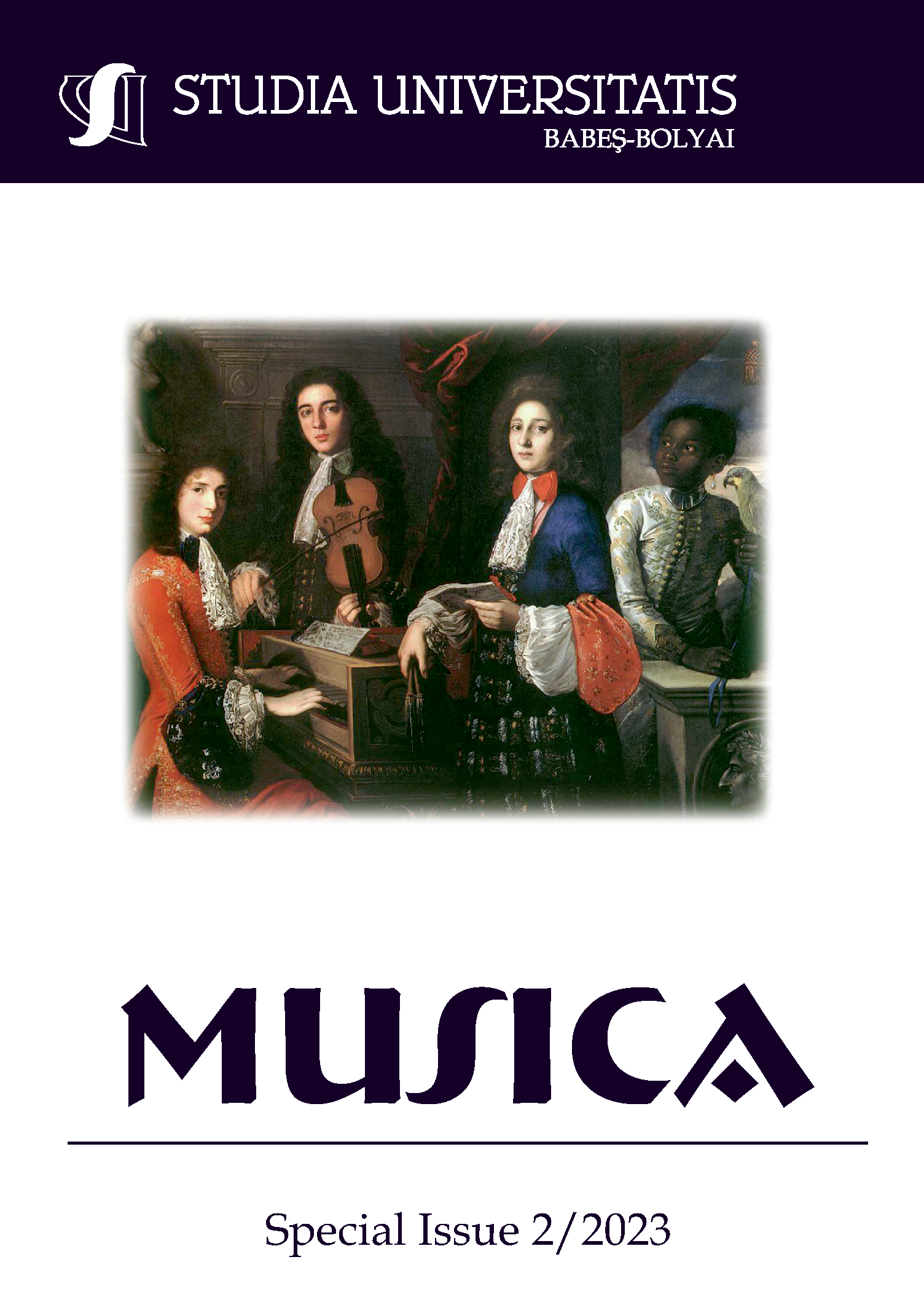SÁNDOR VERESS’S „THRENOS” IN THE LIGHT OF ‘TRADITION’ AND ‘RENEWAL’
DOI:
https://doi.org/10.24193/subbmusica.2023.spiss2.02Keywords:
Sándor Veress, folk music, bartókian principles, style, compositional techniques, analysis, Threnos.Abstract
This paper focuses on the musical analysis of Veress’s orchestral composition, Threnos. Written in 1945 and dedicated to the memory of Bartók, it is a one-movement work, divided into three independent internal sections, each of them representing an orchestral gradation. Being a threnody, Veress inserts two folk-like funeral laments, which are the composer’s melodic inventions, in the style of folk music. Veress, the ethnomusicologist and composer presents the bartókian principle of how to capture the ethos of folk music in its structure, melody, harmony, and rhythm, and how to express it in such a modern and innovative way, that a completely new quality is born from it.
References
Beckels-Willson, Rachel. “A New Voice, a New 20th Century?”. In: Tempo, 2008/Jan, Vol. 62, No. 246, Cambridge University Press, 2008, 36-41. https://www.jstor.org/stable/40072753 (2021. 11. 25.)
Berlász, Melinda. “Veress Sándor – a népzenekutató” (“Sándor Veress – The Ethnomusicologist”). In: Berlász, Melinda (ed.). Veress Sándor. Tanulmányok (Sándor Veress. Studies.). Zeneműkiadó, Budapest, 1982. 136-148.
Bónis, Ferenc. Üzenetek a XX. századból. Negyvenkét beszélgetés a magyar zenéről (Messages from the 20th century. Forty-two conversations on Hungarian music). Püski kiadó, Budapest, 2002.
Csicsery-Rónai, István (ed.). Veress Sándor. Tanulmányok, cikkek, beszédek (Studies, Articles, Speeches). Occidental Press, Budapest, 2007.
Demény, János. “Veress Sándor – életmű-vázlat” (“Sándor Veress – Biographical Sketch”). In: Berlász, Melinda (ed.). Veress Sándor. Tanulmányok (Sándor Veress. Studies). Zeneműkiadó, Budapest, 1982.
Demény, János. “Sándor Veress”. In: Tempo, No. 88 (Spring 1969), 19-22, Cambridge University Press, 1969. https://www.jstor.org/stable/943372 (2022. 03. 21.)
Fekete, Miklós. “Veress Sándor zeneszerzői indulása és erdélyi kötődése” (“The Compositional Beginnings of Sándor Veress and His Transylvanian Bonding.”). In: Dombi, Józsefné – Maczelka, Noémi (ed.) Kodály 140 – Tanulmánykötet (Kodály 140 – Studies). JATEPress, Szeged, 2023, 94-106.
Gerhard, Anselm – Lanz, Doris (ed.). Sándor Veress. Komponist – Lehrer – Forscher. Bärenreiter Verlag, Kassel, 2008.
Györi, László. “Zwischen Romantik und Atonaliät: Wege der ungarischen Musik im 20. Jahrhundert”. In: Osteuropa, Vol. 61, No. 12 (Dezember 2011), Quo vadis, Hungaria? – Kritik der ungarischen Vernunft, Berliner Wissenschfts-Verlag, 2011, 373-382. http://www.jstor.com/stable/44935917 (2022. 03. 21.)
Retkes, Attila. Kontrasztok. 111 beszélgetés muzsikusokkal (Contrasts. 111 Conversations With Musicians). Wellington, Budapest, 2000.
Retkes, Attila. Zenélő ezredkezdet. Válogatott interjúk 2000-2003 (Musical Commencement of the Millenium. Selected Interviews 2000-2003). Nap Kiadó, Budapest, 2004.
Rumy, Balázs. Veress Sándor klarinétversenye (The Clarinet Concerto Sándor Veress). PhD Thesis. Liszt Ferenc Academy of Music, Budapest, 2018.
Szabolcsi, Bence. A melódia története (The History of Melody). Zeneműkiadó, Budapest, 1957.
Szabó, Judit. Hagyomány és megújulás Veress Sándor vonósnégyeseiben (Tradition and Renewal in the String Quartets of Sándor Veress). PhD Thesis. Liszt Ferenc Academy of Music, 2017.
Szenik, Ilona. Népzenetudományi jegyzet – magyar és román népzene (Notes on Ethnomusicology – Hungarian and Romanian Folk Music). Erdélyi Tankönyvtanács, Kolozsvár, 1998.
Tallián, Tibor. Magyar képek. Fejezetek a magyar zeneélet és zeneszerzés történetéből 1940-1956. (Hungarian Sketches: Chapters from the History of Hungarian Music Culture and Musical Composition, 1940-1956). Balassi Kiadó, Budapest, 2014.
Terényi, Ede. “Veress Sándor alkotóperiódusai. Stíluselemzés” (“Compositional Periods of Sándor Veress. Stylistic Analysis”). In: Berlász Melinda (ed.). Veress Sándor. Tanulmányok (Sándor Veress. Studies). Zeneműkiadó, Budapest, 1982.
Traub, Andreas. Zum instrumentalen Frühwerk von Sándor Veress. In: Archiv für Musikwissenschaft, 45. Jahrgang, H.3, Franz Steiner Verlag, 1988, 224-247. https://www.jstor.org/stable/930853 (2022. 03. 21.)
Traub, Andreas. Sándor Veress. Lebensweg – Schaffensweg. In: TRAUB, Andreas 1986. Sándor Veress. Festschrift zum 80. Geburtstag (Sándor Veress. Commemorative publication on his 80th birthday), Haselhoff, Berlin, 1986, 22-99.
Downloads
Published
How to Cite
Issue
Section
License
Copyright (c) 2023 Studia Universitatis Babeș-Bolyai Musica

This work is licensed under a Creative Commons Attribution-NonCommercial-NoDerivatives 4.0 International License.



